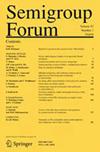同质单元代数的希尔伯特级数差及其归一化
IF 0.7
3区 数学
Q2 MATHEMATICS
引用次数: 0
摘要
Abstract 让 Q 是一个仿射单元,\(\Bbbk [Q]\) 是相关的单元 \(\Bbbk \) -代数,而 \(\Bbbk [\overline{Q}]\) 是它的归一化,这里我们让 \(\Bbbk \) 是一个域。我们讨论了在\(\Bbbk [Q]\) 是同质(即标准分级)的情况下,\(\Bbbk [Q]\) 和\(\Bbbk [\overline{Q}]\) 的希尔伯特序列的区别。更准确地说,我们证明如果 \(\Bbbk [Q]\) 满足塞尔条件 \((S_2)\)那么 \(\Bbbk [Q]\) 的 h-polynomial 的度总是大于或等于 \(\Bbbk [\overline{Q}]\) 的。此外,如果我们放弃假设 \((S_2)\) ,我们也会展示这一声明的反例。本文章由计算机程序翻译,如有差异,请以英文原文为准。
Difference of Hilbert series of homogeneous monoid algebras and their normalizations
Abstract
Let Q be an affine monoid, \(\Bbbk [Q]\) the associated monoid \(\Bbbk \) -algebra, and \(\Bbbk [\overline{Q}]\) its normalization, where we let \(\Bbbk \) be a field. We discuss a difference of the Hilbert series of \(\Bbbk [Q]\) and \(\Bbbk [\overline{Q}]\) in the case where \(\Bbbk [Q]\) is homogeneous (i.e., standard graded). More precisely, we prove that if \(\Bbbk [Q]\) satisfies Serre’s condition \((S_2)\) , then the degree of the h-polynomial of \(\Bbbk [Q]\) is always greater than or equal to that of \(\Bbbk [\overline{Q}]\) . Moreover, we also show counterexamples of this statement if we drop the assumption \((S_2)\) .
求助全文
通过发布文献求助,成功后即可免费获取论文全文。
去求助
来源期刊

Semigroup Forum
数学-数学
CiteScore
1.50
自引率
14.30%
发文量
79
审稿时长
12 months
期刊介绍:
Semigroup Forum is a platform for speedy and efficient transmission of information on current research in semigroup theory.
Scope: Algebraic semigroups, topological semigroups, partially ordered semigroups, semigroups of measures and harmonic analysis on semigroups, numerical semigroups, transformation semigroups, semigroups of operators, and applications of semigroup theory to other disciplines such as ring theory, category theory, automata, logic, etc.
Languages: English (preferred), French, German, Russian.
Survey Articles: Expository, such as a symposium lecture. Of any length. May include original work, but should present the nonspecialist with a reasonably elementary and self-contained account of the fundamental parts of the subject.
Research Articles: Will be subject to the usual refereeing procedure.
Research Announcements: Description, limited to eight pages, of new results, mostly without proofs, of full length papers appearing elsewhere. The announcement must be accompanied by a copy of the unabridged version.
Short Notes: (Maximum 4 pages) Worthy of the readers'' attention, such as new proofs, significant generalizations of known facts, comments on unsolved problems, historical remarks, etc.
Research Problems: Unsolved research problems.
Announcements: Of conferences, seminars, and symposia on Semigroup Theory.
Abstracts and Bibliographical Items: Abstracts in English, limited to one page, of completed work are solicited.
Listings of books, papers, and lecture notes previously published elsewhere and, above all, of new papers for which preprints are available are solicited from all authors.
Abstracts for Reviewing Journals: Authors are invited to provide with their manuscript informally a one-page abstract of their contribution with key words and phrases and with subject matter classification. This material will be forwarded to Zentralblatt für Mathematik.
 求助内容:
求助内容: 应助结果提醒方式:
应助结果提醒方式:


